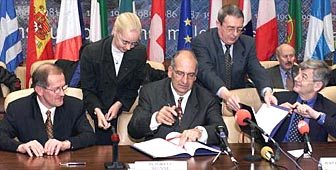Switzerland and Europe: the long road to the treaties

Switzerland's isolation from the rest of Europe goes back much further than 50 years. In fact, ever since Swiss neutrality was recognised by other European powers in the treaty of Westphalia in 1648, Switzerland has remained aloof from Europe.
Apart from being invaded by Napoleon’s army 200 years ago, Switzerland has not been involved in any of Europe’s wars, nor has it directly experienced the destructive ideologies of fascism or communism which affected much of the rest of the continent in the last century.
These factors, plus Switzerland’s system of direct democracy, have contributed to a widely-held view that Switzerland is unique – more unique than other cultures or nations.
And this explains Switzerland’s suspicion of all international organisations and projects which have involved any relinquishing of political sovereignty. It has not only stayed away from the EU, but also from the United Nations and Nato.
But Switzerland, being a land with virtually no raw materials, is more dependent on trade than most countries. In contrast to its political isolation, therefore, Switzerland has taken an active economic role on the international stage.
Hence, Switzerland stayed away from the creation of the Council of Europe and the EU’s precursor, the European Community (EC), in the decade after the end of World War Two. But it was a founding member of two purely economic organisations, the Organisation for Economic Co-operation and Development (OECD) and in 1958, the European Free Trade Associationa (EFTA).
Only after several key members abandoned EFTA and started moving towards the EC in the 1960s, did the Swiss government consider the need for closer ties with the EC. That culminated in the signature in 1972 of a free trade accord, which was accepted by over 70 per cent of the population in a nationwide referendum.
Plans for the creation of a single market in the European Union in 1992 led Swiss businesses to step up pressure on their government to negotiate favourable access for them. Joining the European Economic Area (EEA) would have provided that.
However, the Swiss government began to move too fast for the Swiss, who seemed happy to keep relations with the EU on an economic basis. The government was unhappy about joining the EEA without being able to participate in the decision-making process, and so promoted EEA membership as a stepping stone to joining the EU.
That turned out to be a fatal mistake. The idea proved to be far ahead of its time, and the Swiss people rejected EEA membership in 1992.
After five years of tough negotiations, from 1994 to 1999, the Swiss are now being asked again to vote on a package of measures to ease access to the European market for Swiss businesses as well as individuals. But the question of EU membership, while still the declared long-term intention of the government, is now definitively on the back burner.
by Malcolm Shearmur

In compliance with the JTI standards
More: SWI swissinfo.ch certified by the Journalism Trust Initiative
You can find an overview of ongoing debates with our journalists here . Please join us!
If you want to start a conversation about a topic raised in this article or want to report factual errors, email us at english@swissinfo.ch.